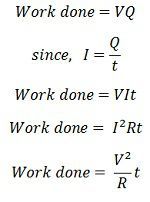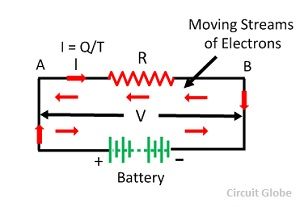Definition: The energy which is caused by the movement of the electrons from one place to another such type of energy is called electrical energy. In other words, electrical energy is the work done by the moving streams of the electrons or charges. Electrical energy is the form of kinetic energy because it produces by the movement of the electrical charges. The faster the movement of charges the more the energy they carry.
Considered a circuit shown in the figure below. When a potential difference P is applied across the circuit a current (I amperes) flow through it for a particular period t seconds. The voltage applied across the circuit is equal to the ratio of the work done by the electrical charge to the number of electrical charges present in the circuit. It is expressed by the formula shown below.
 Therefore work done or electrical energy expanded
Therefore work done or electrical energy expanded
 Unit of Electrical Energy
Unit of Electrical Energy
The basic unit of the electrical energy is the joule (or watt-second).
If the voltage is equal to the one volt, the current is equal to the one ampere and the time is equal to the one second then the electrical energy is equal to the one joule.
Hence the energy expended in an electrical circuit is said to be one joule (or watt second) if one-ampere current flows through the circuit for one second when the potential difference of one volt is applied across it.
The commercial or practical unit of energy is the kilowatt-hour (kWh) which is also known as the Board of Trade (B.O.T) unit.
 Usually, one kWh is called one unit.
Usually, one kWh is called one unit.


this is very informative post about Electrical Energy Definition
this is very informative article thanks
Hi This is Very Informative Information About Definition of Electric Energy Thanks.
Best defination that I got on Electrical energy. Thank you